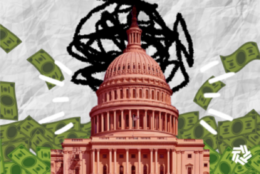
OPM tells agencies to review, streamline performance management, disciplinary policies
Under the latest guidance from the Office of Personnel Management, agencies have new deadlines now to review and then streamline their existing performance mana...
The Office of Personnel Management is calling on agencies to conduct a top-to-bottom review of their existing performance management policies, and then update and tighten up those procedures for disciplining employees for poor performance or misconduct by removing unnecessary steps.
In one of her first memos since becoming the new permanent OPM director, Dale Cabaniss has asked agencies to:
- Review whether their existing policies “create unnecessary barriers to addressing poor performance,”
- Remove steps and procedures in those existing policies that aren’t required by statute or federal regulation, and,
- Give supervisors guidance on performance improvement plans (PIPs), noting that PIPs can begin at any point.
The new guidance is part of the Trump administration’s ongoing efforts to streamline the employee disciplinary process and more quickly address poor performance and misconduct.
Agencies have until have about six months, or until the end of March, to make these updates to their performance management policies. They then have until April 30 to inform OPM of their compliance, according to the memo.
Related Stories

Half of agency supervisors say they’re confident they could remove ‘bad apples’
This latest memo follows new regulations OPM proposed last week, which are largely designed to implement pieces of the president’s May 2018 executive order on employee removals that are not currently enjoined in a series of court battles with federal employee unions.
Agencies already had instructions to review and update their performance management policies according to the goals outlined in the President’s Management Agenda, but this guidance serves as more of a reminder, a senior OPM official told Federal News Network.
It’s also designed to address recommendations from the Government Accountability Office and findings from the Merit Systems Protection Board, as well as feedback that OPM has gathered from the Federal Employee Viewpoint Survey.
According to a 2016 MSPB survey, 80% of managers believe their agency’s culture and the support they receive from the people above them are the most difficult challenges in firing employees.
“The law isn’t changing,” an OPM official said in an interview. “This is still in the parameters of OPM governmentwide regulations. Ultimately, our objective is to make this process more efficient and effective when managers need to apply it and two, to try to address those concerns that we’ve heard when we’ve seen those Federal Employee Viewpoint Survey results about how their organizations do in dealing with poor performers.”
According to the 2018 FEVS, just 32% of federal employees said they believe their agencies take steps to deal with a poor performer who can’t or won’t improve.
“Managers and supervisors generally don’t feel supported by their agency’s leadership and when they need to take actions to address poor performance and misconduct,” the OPM official said. “They don’t always fully understand the processes to address poor performance or misconduct.”
Managers, for example, don’t often know they have two different processes to address poor employee performance, the OPM official said.
“This is an opportunity to make sure they’re informed of what their options are [and] what the processes look like — also to improve the processes,” the senior official said. “We’re asking agencies to look at [whether they] have in their policies or collective bargaining agreements procedures or requirements that are not actually required in the law or required in OPM’s governmentwide regulations. If so, [we want] them to assess whether that’s a barrier to being able to effectively manage their organizations and addressing poor performance and misconduct.”
OPM over the years has seen places where agencies have, perhaps inadvertently, added additional steps to the disciplinary process that stretch beyond the requirements in law.
Some agencies, the OPM official said, have added extra opportunities beyond the traditional improvement period for employees to demonstrate their performance.
Employees also, for example, typically have seven days to respond to their agency’s proposed disciplinary action.
“We’ll see examples where they may be given more time,” the OPM official said. “They may be given more advanced notice or they may be given more than the seven days that the law calls for to respond. As a result, that could have an impact on making it take longer in the process.”
Latest Workforce News
Federal employment attorneys have said, from their perspective at least, it’s the agency investigation that often delays the disciplinary process.
Under the new OPM guidance, agency performance improvement plans and demonstration opportunities won’t necessarily get shorter overnight.
Some have addressed or attempted to shorten performance improvement periods or disciplinary procedures already. The OPM official reiterated agencies must work with federal employee unions — who were highly critical of the proposed regulations on this topic last week — to implement new procedures that might conflict with their existing collective bargaining agreements.
“There is a recognition that the unions aren’t necessarily going to be agreeable to everything that the agencies want to do, but the agencies still have to satisfy their collective bargaining obligations to implement any changes for bargaining employees,” the official said.
Copyright © 2024 Federal News Network. All rights reserved. This website is not intended for users located within the European Economic Area.
Nicole Ogrysko is a reporter for Federal News Network focusing on the federal workforce and federal pay and benefits.
Follow @nogryskoWFED







